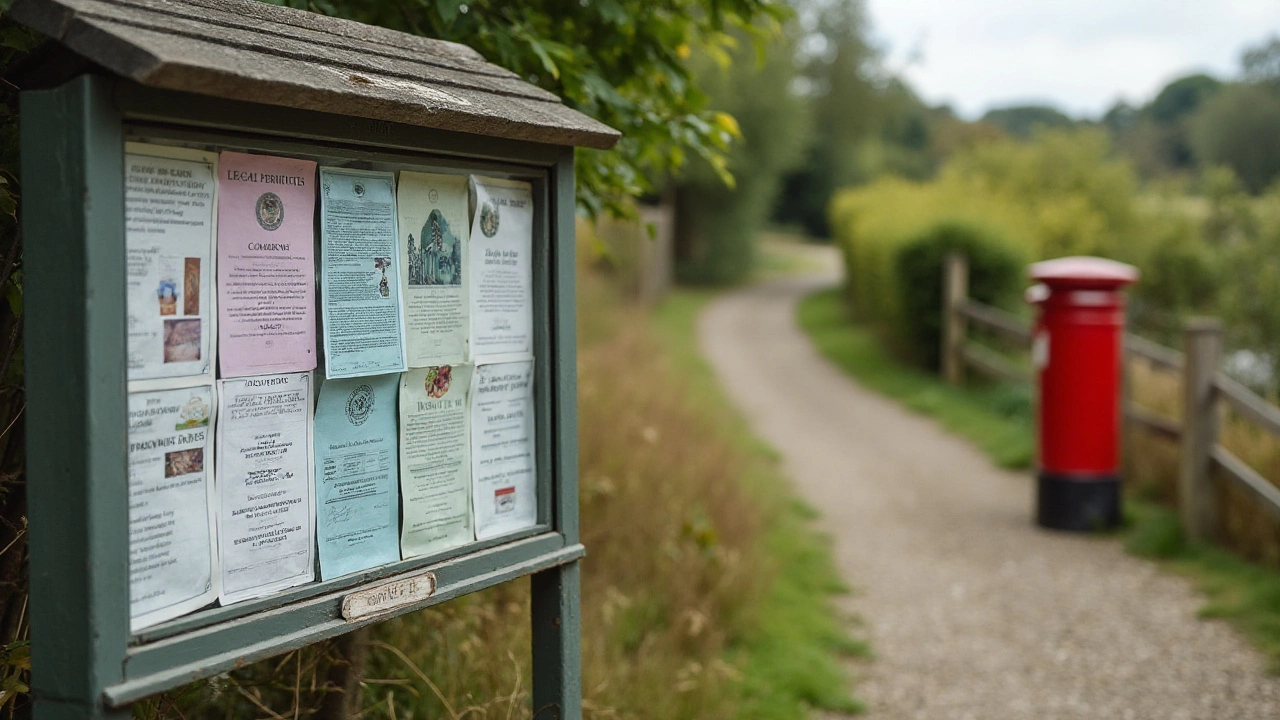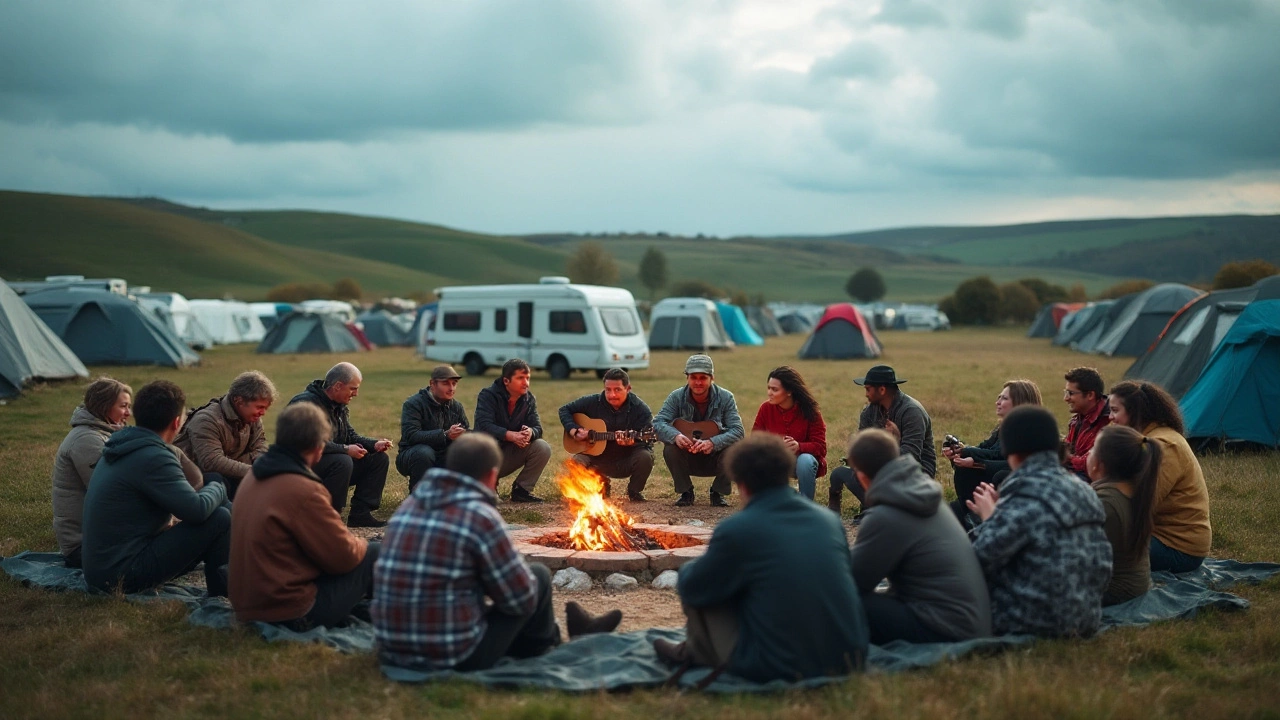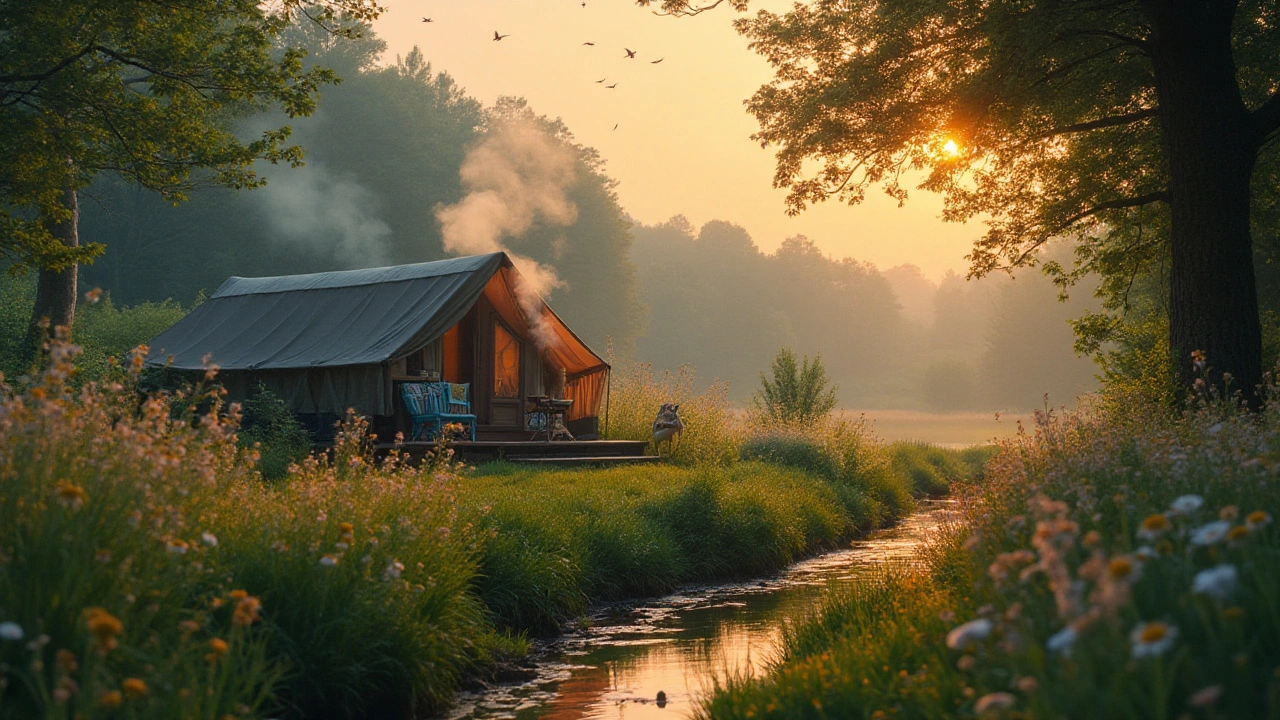Imagine waking up to the serene rustle of leaves, and the gentle calls of morning birds, as your world slowly stirs alive just outside your tent. The allure of living on a campsite in the UK is undeniable for those with a penchant for nature's simplicity and an adventurous spirit.
Yet, while the thought of embracing a rustic lifestyle might give you a thrill, there’s more to consider than just packing your tent and hitting the road. Serious legal and practical matters await the curious camper hoping to lay down roots in this unconventional setting.
Diving into the specifics, it's key to weigh both the benefits and the seemingly never-ending regulations. From understanding local council rules to making sure your temporary abode has the right amenities, our guide offers a clear path through the briar patch of campsite living.
- The Legal Landscape
- Choosing the Right Campsite
- Essential Amenities for Living
- Community and Lifestyle
- Challenges to Consider
The Legal Landscape
Embarking on a journey to make a campsite your permanent residence in the UK is akin to navigating a labyrinthine legal landscape. The appeal of this lifestyle, often touted as free-spirited and unencumbered by conventional trappings, is counterbalanced by significant statutory requirements and local council regulations that a would-be camper must traverse. The central piece of the legality puzzle centers around the status of land ownership and planning permission. Without appropriate permissions, what seems like idyllic freedom could quickly transform into a tangle of legal disputes. The UK's Town and Country Planning Act is an essential piece legislating this aspect, requiring landowners to secure specific planning permissions if the site is to be inhabited longer-term.
An understanding of the critical difference between a holiday site and a residential site is also paramount. The rules governing campsites are largely predicated on this distinction, as holiday sites are designed for temporary stays while residential campsites support long-term living arrangements. You are generally not permitted to live permanently on a holiday site, as this contravenes the site's underlying planning consent, which can lead to enforcement actions by local authorities. In certain cases, local councils have the autonomy to grant exemptions, allowing longer stays. However, these exceptions are not the norm and often come with rigorous eligibility criteria and review processes.
Even among enthusiasts, there is a common misconception regarding this matter. "The regulatory framework is nuanced and demands careful attention," notes Barry Jones, an expert from the British Holiday & Home Parks Association.
“Misunderstanding the regulations can lead to potential pitfalls for those new to campsite living,”Jones emphasizes. His point underscores the vital importance of consulting with legal experts or local council offices before committing to campsite residency. Alongside legalities, consideration must be given to the site’s licensing specifics, which can dictate issues such as the installation of permanent structures like caravans or motorhomes, connecting them to essential services, and adhering to safety protocols.
Additionally, campground living regulations are subject to further complexity with periodic updates, often influenced by broader environmental considerations and public policy adjustments. Some campgrounds are also bound by regional conservation efforts that could impact factors like waste management and energy consumption. This confluence of environmental and spatial planning stipulations is recorded and monitored by regulatory bodies such as the Environment Agency, which adds another layer to the living on campsite dilemma. For instance, environmental health standards may govern sanitation and waste disposal to prevent any potential ecological impact.
One illustrative example is the requirement for campsites to be registered with local authorities under the Caravan Sites and Control of Development Act of 1960, a lingering legacy of post-war development controls, illustrating the breadth of vintage legislation that continues to shape modern campsites. This piece of legislation mandates an operating license, ensuring the site aligns with designated use, safety, and maintenance parameters prescribed by law. Compliance is not merely about meeting minimal criteria; it’s about fostering a viable living space that meets environmental and statutory benchmarks. A table of key regulatory guidelines might be useful as a quick reference:
| Requirement | Description |
|---|---|
| Planning Permission | Needed for residential shift from holiday use |
| Operating License | Legal mandate under Caravan Sites and Control of Development Act, 1960 |
| Environmental Compliance | Managed by Environment Agency to protect local ecology |
In essence, pursuing a campsite-centric lifestyle demands a robust understanding of these legal intricacies. Each decision has the potential to impact not only personal freedom but broader community relations and environmental stewardship. Thus, for those entranced by the canvas-set allure of UK camping, undertaking due diligence and remaining informed is not just advisable; it's imperative.
Choosing the Right Campsite
Living on a campsite in the UK is more than simply selecting a picturesque spot to pitch your tent. This endeavor demands thoughtful consideration of various factors, each influencing your day-to-day comfort and peace of mind. One of the first steps in finding your perfect spot is identifying whether the campsite living UK dream aligns with your logistical and lifestyle needs. It’s not just about the view; it’s also about what’s feasible concerning legalities and practical needs.
To start, different campsites offer varied levels of amenities and services. Many commercial and private sites offer essentials such as electricity hook-ups, water supply, and sewage disposal, essential for a sustainable living experience. However, finding these facilities should match your expected living standards. Some people embrace a more rustic lifestyle with limited access to such comforts—a detail worthy of contemplation when deciding if you prefer a more off-the-grid existence or one with modern conveniences.
Location plays a crucial role when considering campsite living. A site situated near a town or village can offer convenient access to services and the chance to engage with local communities, helping avoid a sense of isolation, which can be a common challenge. Others might prefer a more remote setting, where the tranquility of nature is the primary backdrop. In any case, consider proximity to necessities such as grocery stores, medical facilities, and safe transport routes.
It’s prudent to research the campsite owner or management policies as well. Many residential camping UK regulations involve a permitted stay limit, often varying between campsites—from a few weeks to a more extended period in some. Understanding these policies beforehand is critical to avoid unforeseen inconveniences. In addition, some campsites may have specific guidelines concerning pet ownership, the amount of equipment allowed, noise levels, or waste disposal methods to sustain an environmentally friendly site.
To further aid in your decision, consulting experienced campsite dwellers can provide valuable insights. Many online forums and groups focus on UK camping where seasoned campers share recommendations or cautionary tales.
"The best advice often comes from those who've lived through what you’re about to start," says Sarah Knight, a seasoned camper with over a decade of experience navigating UK campsites.Such wisdom can guide newcomers in making well-rounded decisions as they step into this lifestyle.
Lastly, check for hidden costs. Beyond the obvious expenses like pitch fees, some sites charge for additional services such as showers, laundry facilities, or internet access. A clear budget that factors in these aspects can make campsite living not only manageable but also enjoyable. Whether you are inclined towards nature's embrace or the community's heart, choosing the right campsite is a quest that requires patience, research, and a clear vision of the lifestyle you wish to create.

Essential Amenities for Living
When considering a move to permanent life on a campsite, your ability to adapt might get severely tested by the lack of amenities you once took for granted. While embracing the simplicity and closeness to nature is enchanting, ensuring a balanced lifestyle is crucial. One primary focus should be securing access to utilities like water, electricity, and sanitation, which form the backbone of day-to-day living. Many UK campsites provide basic amenities; however, the availability and reliability can vary widely. Therefore, it's essential to thoroughly research your chosen spot.
Water supply is of paramount importance. Whether it be connection to the site's main supply or relying on bottled water, one's chosen solution should be both convenient and sustainable. In terms of power, setting up solar panels or a generator might be necessary if electrical hook-ups are non-existent or limited. What's more, access to a septic tank or appropriate waste disposal facilities ensures the surrounding environment remains clean, and personal hygiene is maintained. Waste management regulations often differ, so understanding the rules of your local council will prevent hiccups in the long run.
Connecting to the Digital World
In this digital era, internet connectivity is indispensable, even for the most reclusive campsite dwellers. Fortunately, several options exist—mobile broadband, satellite internet, or long-range Wi-Fi antennas. While traditional broadband might be out of reach in some secluded areas, mobile solutions can prove to be as effective as they are flexible. Investing in a mobile hotspot could offer speeds suitable for both basic and more demanding needs – from emails to streaming your favourite series, keeping you connected to the wider world while residing in your UK camping haven.
Staying Warm and Well-Fed
The beauty of the great outdoors can often come with unpredictable weather, notably in the UK where the climate is famously changeable. Ensuring warmth during cold months hinges on reliable heating solutions – think portable gas heaters or eco-friendly wood stoves. Pair these with well-insulated tents or portable cabins to seal in the warmth. When it comes to food, having a portable camping stove or an outdoor fire pit provides versatile cooking options. Keeping meals simple without sacrificing nutrition is the goal; perhaps trying out a mix of creatively cooked foods on your residential camping UK adventure.
As famed outdoors author, Chris Townsend, once concluded, "Living under the stars is a continuing discovery of what is important and what we can simplify."
Community Facilities and Support
Lastly, the social aspect is not to be overlooked. A sense of belonging can vastly enhance the campsite living experience. Some locations come equipped with communal spaces, ensuring residents never feel isolated. Having access to a community of like-minded individuals allows shared learning experiences and support networks to flourish. Participating in communal activities like DIY workshops or gardening can often surprise with friendship and humor if considered. Being proactive in these communities might unearth valuable secrets for thriving in the unique lifestyle that is living at campgrounds.
To sum it all up, while the basic facilities may be scant, creativity and resourcefulness can ensure that one's stay in the wild remains hospitable yet exhilarating. The key is striking a balance, ensuring you have those essential amenities covered to enjoy the charm of your new way of life fully.
Community and Lifestyle
Living on a campsite in the UK offers a unique and rewarding experience that goes beyond just proximity to nature. It’s about becoming part of a community of like-minded individuals who share a love for the great outdoors and a desire for a simpler way of life. When you settle on a campsite, you’re not merely pitching a tent; you’re joining a vibrant ecosystem of fellow campers, some who stay for the season, others indefinitely. This community aspect can foster friendships based on shared experiences such as campfires, hiking trips, and communal meals. The connections formed here are often deep and genuine, nurtured by a shared appreciation for the surrounding nature.
One of the great benefits of campsite living is the potential for social interaction and friendship among residents. Unlike the solitude of a hermit, campsite communities thrive on mutual aid and interaction. For instance, neighbors might help each other set up tents or organize group excursions into the wild. What’s more, many campsites organize events and activities, offering opportunities for both young and old to engage—be it storytelling nights, fishing competitions, or craft mornings. These events are more than just entertainment; they are chances to solidify bonds and truly integrate into the community fabric.
The lifestyle on a residential camping UK ground varies based on location and camp type. Some choose campsites nestled deep in national parks, where the absence of urban noise amplifies the natural sounds of crickets and owls, creating a peaceful symphony under the stars. Others might prefer slightly more urban-adjacent campsites that strike a balance between nature and necessity, offering quick access to essential services without straying too far from the campfire. It's an adaptable lifestyle, providing the flexibility to switch between regions and setups according to the seasons or personal preference. However, irrespective of the choice of site, the fundamental ethos of campsite living remains the same—embracing simplicity and environmental mindfulness.
Moving to a UK camping ground as a permanent residence can also present its challenges, particularly when it comes to lifestyle adjustments. Residents often learn to live with limited space, adopting both practical skills and space-saving techniques that might seem alien in traditional living situations. This experience cultivates creativity and resourcefulness, such as by creating DIY storage solutions or finding innovative ways to harness natural elements. With limited space and facilities, life on a campsite encourages an appreciative and minimalist attitude towards belongings, fostering a focus on experiences and relationships rather than material possessions.
Moreover, there’s a communal respect ingrained in campsite culture, where awareness and conservation of natural resources are paramount. Many campsites in the UK emphasize sustainability and eco-friendliness, encouraging recycling, responsible waste disposal, and efficient use of resources. Residents often find themselves learning new habits, such as conserving water during showers in the shared facilities or participating in community-led initiatives like tree planting or litter picking. This concerted effort helps to ensure that the campground living remains a harmonious refuge for both people and wildlife.
As Emily Hamilton, a long-term resident of a Dorset campsite, once said, "There’s a unique joy in sharing stories under the stars with strangers who quickly become friends. We build this temporary village together, each person vital in their own way."

Challenges to Consider
Venturing into a lifestyle centered around campsite living UK presents a unique set of challenges that require thoughtful consideration. First and foremost, weather conditions in the UK are notoriously unpredictable, with rain often taking center stage. Imagine planning a cozy outdoor evening only to be thwarted by an unexpected downpour, which could easily become a regular occurrence. This unpredictability can put a damper on simple daily routines, from drying clothes to ensuring your tent or caravan remains a dry haven. The need for proper, weather-resistant gear becomes paramount, pushing campers to invest heavily in durable outdoor furnishings and camping equipment. For anyone used to the conveniences of urban life, adapting to nature's whims can prove daunting and sometimes demoralizing.
Navigating the legal requirements of calling a campsite home also introduces its own challenges. Many campsites in the UK operate on seasonal bases, making it difficult for full-time residents to secure long-term accommodation. There’s often a legal limit to the number of consecutive days one can stay in a campsite, which is typically set by local councils. Overlooking these limits can lead to fines or even eviction, requiring campers to frequently move between sites. This transient lifestyle may seem appealing to some but can become exhausting, both physically and mentally, over time. The necessity to continually pack and unpack belongings becomes an art form – one that demands patience and meticulous organization.
Access to essential amenities poses another significant hurdle. While some campsites offer basic services, like electricity, water, and waste disposal, others might be more rudimentary. This could mean making frequent trips to local towns for restocking supplies, which can be cumbersome without reliable transportation. Cooking facilities might be limited, compelling creative workarounds or reliance on dining out, which can strain tight budgets. Moreover, connectivity issues should not be underestimated. While disconnecting from the digital world sounds refreshing, many find it a necessity. Patchy mobile networks and limited internet access in remote campsites could impede everything from remote work to staying in touch with loved ones. In 2023, those choosing this lifestyle cited connectivity challenges as a top concern, according to a report by The Camping and Caravanning Club.
Social aspects of campsite living should also be weighed. While the idea of joining a community of like-minded individuals carries its social advantages, there's also the unmatched solitude that comes with life on the road. Not everyone is suited for the quiet and isolation that camping can offer, especially over extended periods. The sense of community tends to ebb and flow with the seasons, as residents come and go. Building lasting relationships might take longer, and for some, the erratic social life can trigger feelings of loneliness. Straddling between the peaceful escape offered by nature and maintaining some degree of social interaction requires balance and initiative.
Finally, managing waste responsibly within the confines of a campsite can be strictly regulated, posing another practical challenge. With every campsite working under different guidelines, understanding how waste management operates is crucial. Improper waste disposal does not only invite steep penalties but can also lead to environmental harm, undermining the very essence of life immersed in nature. Campers need to become adept at recycling, composting, and reducing waste—it’s all part of the learning curve that accompanies a commitment to living within a campsite.
